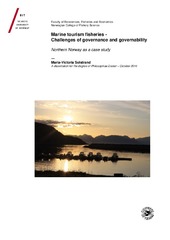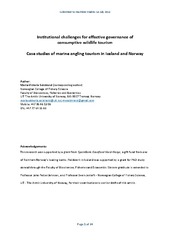| dc.contributor.advisor | Johnsen, Jahn Petter | |
| dc.contributor.author | Solstrand, Maria-Victoria | |
| dc.date.accessioned | 2015-01-07T14:39:11Z | |
| dc.date.available | 2015-01-07T14:39:11Z | |
| dc.date.issued | 2014-12-17 | |
| dc.description.abstract | The research focus for this dissertation is marine tourism fisheries – a sector rapidly growing in popularity in Northern Norway. Data from this research study suggest that the ecological impacts may be more significant than previously thought. As such, it is suggested that marine tourism fisheries be considered separately from recreational fishing, and alongside commercial-scale and small-scale fisheries with regard to fish stock impacts and management.
The overarching research question being answered with this dissertation is: What are the critical components of a governance strategy that would support a sustainable path of development for marine tourism fisheries in Norway?
To answer this question, a case study analysis was conducted of marine angling tourism (MAT) in Northern Norway — a popular form of consumptive wildlife tourism in the Arctic fjords.
MAT offers great potential to contribute to regional development of the remote coastal regions of Norway; but it is generating conflict, primarily as the result of tourists’ non-compliance with Norway’s regulations.
This dissertation explores in depth why the fish as a natural resource cannot be managed separately, but must be managed with consideration of MAT as a complex socio-ecological system. Sustainable tourism development for this form of consumptive wildlife tourism requires that a management strategy find balance between prioritizing the mitigation of multi-stakeholder conflicts; providing sufficient ecological data to protect vulnerable fish stocks; and enhancing the tourist experience such that tourists will return and recommend.
In order to determine how such balance might be achieved, the governance and governability of MAT in Norway are examined — breaking down governance into smaller, more workable segments. The theoretical models chosen as the lenses through which to explore and interpret the complex relationships within MAT as a socio-ecological system were drawn from the principles of interactive governance theory, and institutional theory applied to common pool resources.
Elements from Iceland’s system of governance for MAT are used to highlight areas of consideration for inclusion in a modified governance strategy in Norway (Articles 1 and 3). Article 2 quantitatively examines tourist behaviour with regard to non-compliance, and the implications for natural resource management. Article 3 presents a modified model for analysing institutional inter-dynamics of a complex socio-ecological system that includes four institutional pillars.
Among the critical components of a governance strategy that would support a sustainable path of development are included: creating regulations that match how MAT functions in practice; activating the tourists’ participatory role to collect vital catch statistics in support of ecosystem-based management; consideration of the communities as stakeholders; and improving conflict mitigation mechanisms.
With greater understanding of how MAT functions, comes the possibility of finding solutions for how to more effectively govern marine tourism fisheries in Norway. | en |
| dc.description.doctoraltype | ph.d. | en |
| dc.description.popularabstract | Utenlandske turisters fiske i Norge har økt i omfang de siste årene. Påvirkningen på det marine økosystemet kan være større enn antatt. Denne PhD-avhandlingen studerer utviklingen av marint turistfiske (Marine Angling Tourism - MAT) i Norge. Arbeidet er basert på en case-studie i Nord-Norge, der en gjennom bruk av kvalitative og kvantitative data har undersøkt forvaltningen og forvaltbarheten av turistfisket. Studien trekker fram elementer fra den islandske forvaltningen av MAT og bruker dem til å identifisere områder der norsk forvaltning bør bli mer bærekraftig. Det settes fokus på konflikter som følger av turistenes manglende etterlevelse av regler.
Kritiske komponenter som bør inngå i en forvaltningsstrategi:
• Fastsette regler som samsvarer med hvordan MAT fungerer i praksis.
• Øke turistenes engasjement i å utvikle en mer økosystembasert forvaltning.
• Trekke lokalsamfunn og lokale aktører inn som medspillere i forvaltningen.
• Utvikle mekanismer for bedre konflikthåndtering | en |
| dc.description.sponsorship | Research was supported by a personal research grant from one of Northern Norway’s banks — SpareBank1 Nord Norge Gavefond (170.000 NOK). Phase 1 — the exploratory field work — was funded by the research programme Service Innovation and Tourist Experiences in the High North: The Co-Creation of Values for Consumers, Firms and the Tourism Industry, financed by the Norwegian Research Council, Project no: 195306/140 (60.000 NOK). The fieldwork conducted in Iceland was funded by the Faculty of Biosciences, Fisheries and Economics through a grant for study abroad (85.000 NOK). | en |
| dc.description | Papers number 1 and 2 of this thesis are not available in Munin:<br> 1. Maria-Victoria Solstrand: ‘Marine angling tourism in Norway and Iceland: Finding balance in management policy for sustainability’, Natural Resources Forum 37 (2013) 113–126. Available at <a href=http://dx.doi.org/10.1111/1477-8947.12006>http://dx.doi.org/10.1111/1477-8947.12006</a><br> 2. Maria-Victoria Solstrand, Thomas Gressnes: ‘Marine angling tourist behavior, non-compliance, and implications for natural resource management’,Tourism Management, 45 (2014) 59-70. Available at <a href=http://dx.doi.org/10.1016/j.tourman.2014.03.014>http://dx.doi.org/10.1016/j.tourman.2014.03.014</a> | en |
| dc.identifier.isbn | 978-82-8299-091-4 | |
| dc.identifier.uri | https://hdl.handle.net/10037/7001 | |
| dc.identifier.urn | URN:NBN:no-uit_munin_6591 | |
| dc.language.iso | eng | en |
| dc.publisher | UiT The Arctic University of Norway | en |
| dc.publisher | UiT Norges arktiske universitet | en |
| dc.rights.accessRights | openAccess | |
| dc.rights.holder | Copyright 2014 The Author(s) | |
| dc.rights.uri | https://creativecommons.org/licenses/by-nc-sa/3.0 | en_US |
| dc.rights | Attribution-NonCommercial-ShareAlike 3.0 Unported (CC BY-NC-SA 3.0) | en_US |
| dc.subject | marine angling tourism | en |
| dc.subject | consumptive wildlife tourism | en |
| dc.subject | sustainable tourism development | en |
| dc.subject | interactive fisheries governance | en |
| dc.subject | tourist behaviour | en |
| dc.subject | institution | en |
| dc.subject | socio-ecological systems | en |
| dc.subject | common pool resources | en |
| dc.subject | Iceland | en |
| dc.subject | Norway | en |
| dc.subject | marine tourism fisheries | en |
| dc.title | Marine tourism fisheries - Challenges of governance and governability
Northern Norway as a case study | en |
| dc.type | Doctoral thesis | en |
| dc.type | Doktorgradsavhandling | en |


 English
English norsk
norsk




